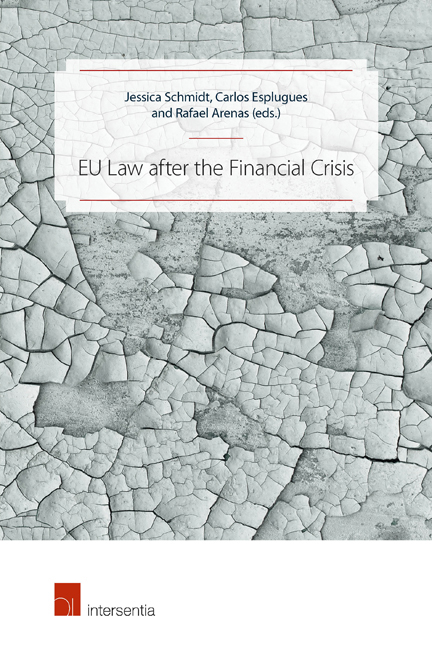Book contents
- Frontmatter
- Contents
- List of Abbreviations
- List of Authors
- Introduction
- PART I RESCUE MECHANISMS AND MONETARY POLICY
- PART II THE IMPACT OF THE FINANCIAL CRISIS ON THE BANKING SECTOR AND CAPITAL MARKETS
- PART III THE FINANCIAL CRISIS AND TAX LAW
- PART IV THE FINANCIAL CRISIS, CONSUMERS AND CONSUMER LAW
- PART V THE FINANCIAL CRISIS AND COMPETITION LAW
- PART VI THE FINANCIAL CRISIS, RESTRUCTURING AND INSOLVENCY LAW
- PART VII THE SOCIAL DIMENSION OF THE FINANCIAL CRISIS AND EU CITIZENSHIP
- PART VIII REFLECTIONS ON THE IMPACT OF THE FINANCIAL CRISIS ON THE GENERAL EUROPEAN LEGAL FRAMEWORK AND THE FUNDAMENTAL “EUROPEAN IDEA”
- Legal Certainty after the Crisis. The Limits of European Legal Imagination
- The New Role of Judges in the EU. Going Back to the Middle Ages
- Exploring the European Crisis's Political Discourse. Europe as a Consciousness, Europe as a Narrative
Testing the Stress of the EU: Financial Crisis or EU Law in Crisis?
from PART VIII - REFLECTIONS ON THE IMPACT OF THE FINANCIAL CRISIS ON THE GENERAL EUROPEAN LEGAL FRAMEWORK AND THE FUNDAMENTAL “EUROPEAN IDEA”
Published online by Cambridge University Press: 13 December 2017
- Frontmatter
- Contents
- List of Abbreviations
- List of Authors
- Introduction
- PART I RESCUE MECHANISMS AND MONETARY POLICY
- PART II THE IMPACT OF THE FINANCIAL CRISIS ON THE BANKING SECTOR AND CAPITAL MARKETS
- PART III THE FINANCIAL CRISIS AND TAX LAW
- PART IV THE FINANCIAL CRISIS, CONSUMERS AND CONSUMER LAW
- PART V THE FINANCIAL CRISIS AND COMPETITION LAW
- PART VI THE FINANCIAL CRISIS, RESTRUCTURING AND INSOLVENCY LAW
- PART VII THE SOCIAL DIMENSION OF THE FINANCIAL CRISIS AND EU CITIZENSHIP
- PART VIII REFLECTIONS ON THE IMPACT OF THE FINANCIAL CRISIS ON THE GENERAL EUROPEAN LEGAL FRAMEWORK AND THE FUNDAMENTAL “EUROPEAN IDEA”
- Legal Certainty after the Crisis. The Limits of European Legal Imagination
- The New Role of Judges in the EU. Going Back to the Middle Ages
- Exploring the European Crisis's Political Discourse. Europe as a Consciousness, Europe as a Narrative
Summary
When I was asked by Professor Jessica Schmidt to participate in the conference on which this book is based, we briefly discussed whether it is actually accurate to say that we are already facing the aftermath of the financial crisis in Europe. I must admit, I still cannot answer this question. I can see that Europe and the EU Member States have reacted, both on a national and on a supranational level, to regulate the banking industry in order to stabilise the financial sector and in order to restore confidence and mutual trust in the credit system. But an analysis of the question whether these new mechanisms are strong enough to have already put an end to the financial crisis and to prevent major economic shocks in the future is, frankly speaking, beyond my expertise.
What I currently observe is – and I draw the same conclusion from the contributions in this volume – that there is a notable shift from the “financial” aspect of the crisis to a somewhat fundamental challenge of the entire European project. The financial crisis has led to a notable extent of frustration and mistrust on nearly all relevant levels of society: What could be meant by the idea of “European solidarity”, notably when it comes to finances, nowadays seems profoundly unsettled and puzzling; take the current credit negotiations with Greece as a striking example. Political parties that advocate an exit from the European Union or the Eurozone, respectively, are gaining more and more of the popular vote. Credit squeeze problems do not seem to have been overcome – although the financial market is currently flooded with cheap money. And the general public seems increasingly unwilling to function as an insurance coverage for financial players which are “too big to fail”. In my view, this goes hand in hand with a growing suspicion about what individual benefits may flow from the European system and EU law in general.
In my judgement, the general role of EU law after the financial crisis should, therefore, be more thoroughly discussed. We should not only analyse the regulatory systems implemented to prevent future crises, but also ask how we can best use EU law as an integrative instrument.
- Type
- Chapter
- Information
- EU Law after the Financial Crisis , pp. 333Publisher: IntersentiaPrint publication year: 2016



